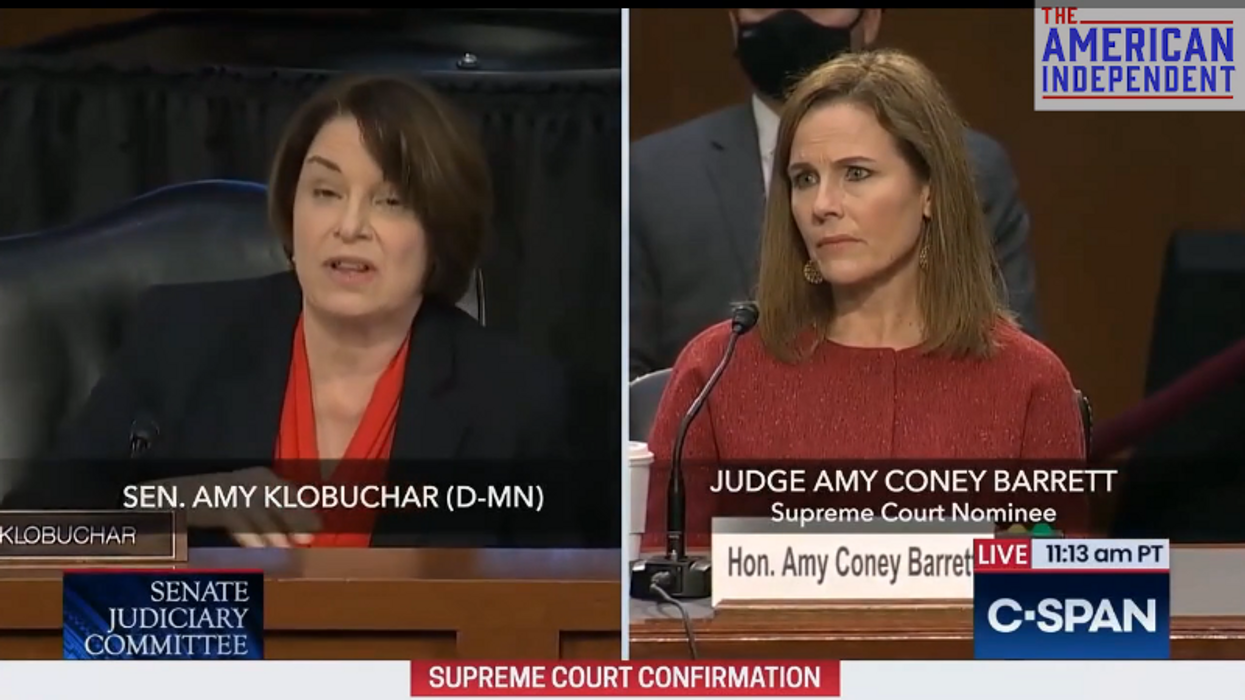Barrett Wouldn't Say That Voter Intimidation Is a Federal Crime

Sen. Amy Klobuchar and Judge Amy Coney Barrett
On the second day of her Supreme Court confirmation hearings, Judge Amy Coney Barrett refused to answer Sen. Amy Klobuchar's (D-MN) questions when asked whether federal law prohibits voter intimidation at the polls.
In recent months, voter intimidation and voter suppression have been hot-button issues, with Donald Trump during the first presidential debate going so far as to openly solicit his supporters to commit voter intimidation.
"Go to the polls and watch very carefully," Trump said, before spiraling into frequently debunked conspiracy theories about widespread voter fraud in Pennsylvania.
Discussing poll watching by armed citizens, Klobuchar had a pressing question to ask Barrett during her allotted time.
"Judge Barrett, under federal law, is it illegal to intimidate voters at the polls?" Klobuchar asked.
Barrett declined to answer.
"I can't characterize the facts in a hypothetical situation, and I can't apply the law to a hypothetical set of facts," she said. "I can only decide cases as they come to me, litigated by parties on the full record, after fully engaging precedent, talking to colleagues, writing an opinion. And so I can't answer questions like that."
Klobuchar pushed back. She cited 18 U.S.C. 594, which outlaws intimidation, threats, and coercion at the polls or attempts to do so "for the purpose of interfering with the right of ... (a) person to vote."
"This is a law that has been on the books for decades," said Klobuchar.
She then turned to the question of armed citizens watching polls.
"Do you think a reasonable person would feel intimidated by the presence of armed civilian groups at the polls?" Klobuchar asked.
Barrett again demurred.
"I'm not sure whether to say it's soliciting a legal opinion (of) me, because the reasonable person standard as you know is ... common under the law, or just an opinion as a citizen, but it's not something that's really appropriate for me to comment on," she said.
Klobuchar also brought up the precedent Supreme Court case of Shelby County v. Holder, which struck down two provisions of the Voting Rights Act of 1965.
She read aloud part of the late Justice Ruth Bader Ginsburg's dissent to the decision, which noted that striking down the provisions was akin to "throwing away your umbrella in a rainstorm because you are not getting wet."
"(Did you know) over 20 states have now made more restrictive voting laws than they did before that case?" asked Klobuchar. "It seems to me that the proof is in the pudding."
She added that while Barrett may claim voting is a right, her judicial record seems to undercut this position.
"The Voting Rights Act is so key," Klobuchar said. "We're talking about the entire foundation of our democracy here."
She went on to review in front of Barrett various incidents nationwide to illustrate concerns about voter suppression.
In April, the Supreme Court ruled that Wisconsin residents could not have an extended deadline on absentee ballots despite the pandemic.
"States have policies that make it harder to vote," Klobuchar said, noting that in Wisconsin, voters were "standing in line in pandemics and homemade masks and garbage bags in a rainstorm" when forced to vote in-person due to the SCOTUS decision.
"Seventy of them got COVID," she added, quoting Ginsburg's fiery dissent stating that the majority opinion "boggled the mind."
In North Carolina, key elements of the Voting Rights Act were recently struck down and signature-matching laws upheld, effectively disenfranchising many Black voters.
In Tennessee, Secretary of State Tre Hargett has expressed vehement opposition to drop-off ballot boxes.
A week ago, the Supreme Court reinstated a statute requiring voters in South Carolina to get witness signatures to mail-in and absentee ballots — in the midst of a pandemic.
This month, Texas Republican Gov. Greg Abbott hired "poll watchers" and limited drop-off ballots to one per Texas county, including large counties like Harris County, which has 4.7 million residents. The decision was challenged, but a federal appeals court upheld it.
Trump continues to promote narratives about fictional mail-in voter fraud and fearmongering nationwide, with a seemingly particular animus toward voters of color.
Under questioning by Klobuchar, Barrett could easily have cleared up any confusion on the legality of voter intimidation and condemned the practice.
By choosing not to, it calls into question her respect for the law — and her fitness for the highest court in the land.
Published with permission of The American Independent Foundation.
- Sen. Mike Lee -- Unmasked And Covid-Positive -- Turns Barrett ... ›
- Trump Chooses Far-Right Judge Barrett For Ginsburg Seat ... ›
- WATCH: Barrett Deflects Questions On Roe, Despite Publicly Urging ... ›
- Barrett Won’t Say Whether Medicare Is Constitutional - National Memo ›
- WATCH: Barrett Refuses To Answer Voting Rights Questions - National Memo ›
- What Judge Barrett Has Been Hiding From The Senate - National Memo ›
- The Vital Questions Our Senators Neglected To Ask Judge Barrett - National Memo ›
- Voter Intimidation Efforts Erupt In Florida At Trump’s Behest - National Memo ›
- Soiled By Blatant Partisan Bias, Barrett Must Recuse — But Will She? - National Memo ›
- Justice Alito Arrogantly Threatens To Interfere With Pennsylvania Count - National Memo ›
- WATCH: Trump Supporter Threatens Driver Unless She Votes For Trump - National Memo ›
- Republicans Trying To Restrict Voting May See Their Schemes Backfire - National Memo ›








